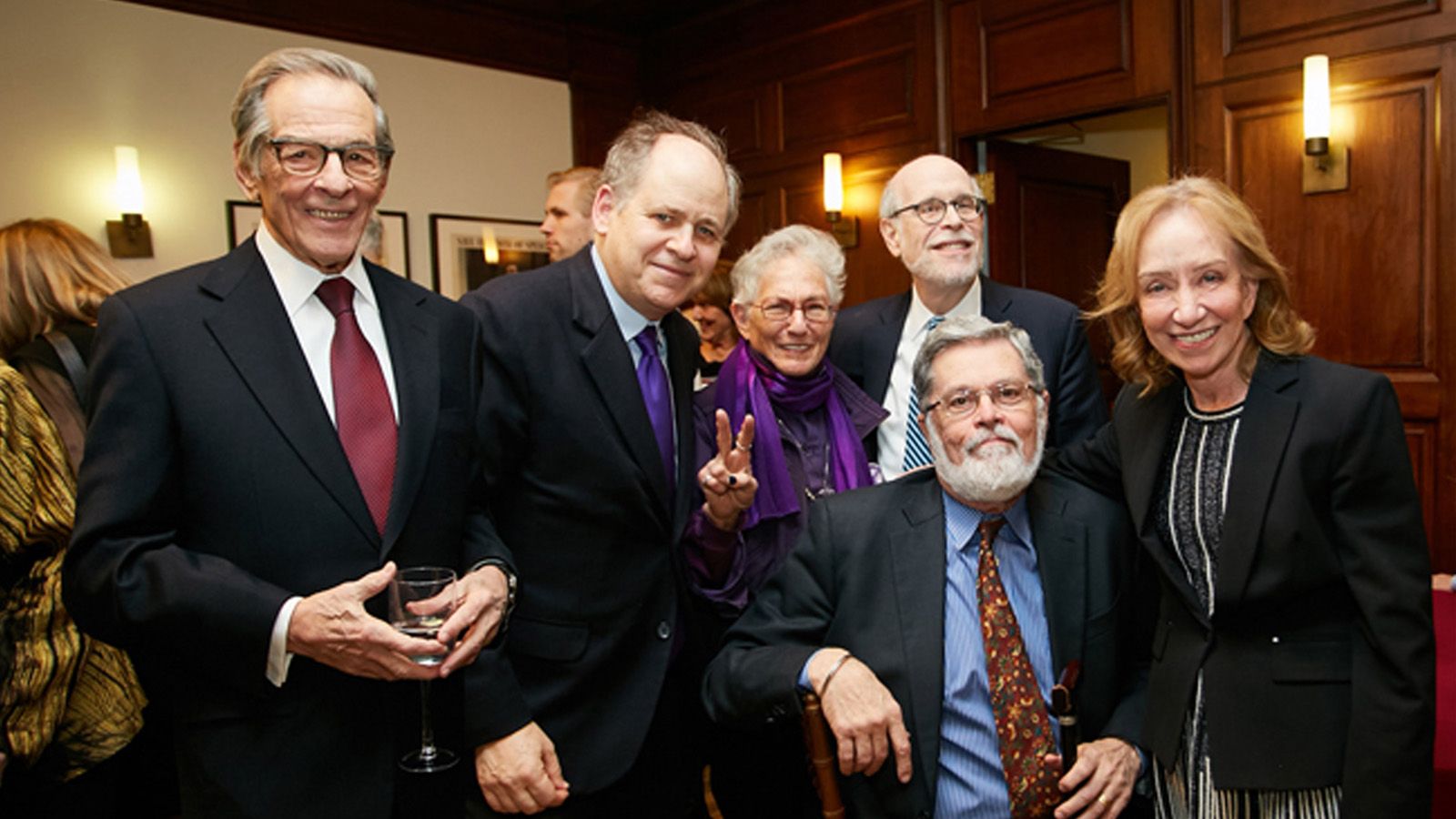A group of renowned historians and Hunter College alumni and staff joined College President, Jennifer J. Raab and Roosevelt House Public Policy Institute Director Harold Holzer to celebrate the 75th anniversary of Roosevelt House at Hunter College.
It was 75 years ago that Hunter College purchased the now named Roosevelt House from Franklin and Eleanor Roosevelt, who lived in the home on East 65th Street from 1908. The house, commissioned in 1906 as a Christmas gift from Franklin’s mother Sara, served as the Roosevelts’ home beginning in 1908—with Sara living in the adjacent townhouse, entering through the same door and keeping a watchful eye over the newlyweds.
Roosevelt House’s current status as a Public Policy Institute furthers its legacy as a historical landmark and a home of history-makers. The house was where the Roosevelts raised their family and where Franklin rehabilitated himself after his bout with polio. It was the launching ground for their careers in public service, the headquarters for their administration when they were not in the White House, the place where the New Deal and Social Security were conceived and the incubator for Eleanor’s lifelong dedication to advancing human rights. “At Roosevelt House,” said President Jennifer J. Raab at the 75th anniversary celebration, “history was made, generations educated and diversity celebrated.”
The sale of Roosevelt House to Hunter College in 1943 deepened the Roosevelts’ longstanding relationship with Hunter College. What is now Hunter’s North Building was built with New Deal funding, specially allocated by FDR. Eleanor met with Hunter students in the college library and welcomed those young women into her home, even serving them homemade grilled cheese sandwiches. Eleanor was the commencement speaker at the 1942 graduation. When Eleanor feared that the asking price of $60,000 was too high for Hunter to afford, she negotiated it down to $50,000 ($726,000 in today’s dollars) and a significant bargain for a townhouse of its size and location, which would be valued at $24.5 million in the neighborhood on today’s market according to the New York Times.
When President Raab took over the Hunter College presidency 17 years ago, Roosevelt House had fallen into extreme disrepair. She made it her mission to preserve and reimagine the treasured building for a new era, with its rehabilitation representing the renaissance of Hunter College. Architect James Polshek was commissioned to re-develop the space for its new purpose as a leading public policy institute, preserving the architectural details—including the elevators that had helped FDR get from floor to floor in his armless wheelchair—and creating a functional, beautiful building that now hosts so many of Hunter’s programs and special events.
Polshek was in the audience for the anniversary event, along with many other people who have participated in the legacy of Roosevelt House over its life at Hunter College: Jonathan Fanton, President of the American Academy of Arts & Sciences and the first Director of Roosevelt House; Robert Caro, author of The Power Broker, who has spoken and lectured at Roosevelt House symposia; Blanche Wiesen Cook ’62, author of a three volume series on Eleanor Roosevelt; Geoffrey Ward, American history expert and author of A First Class Temperament; and many other donors and friends of the house who have facilitated and contributed to its programs throughout the years.
Roosevelt House is known for hosting in-depth interviews with renowned historians and scholars, and the main event of the anniversary celebration was no exception. Guests enjoyed a lively discussion between Doris Kearns Goodwin, presidential historian and Pulitzer Prize-winning author, and Harold Holzer, the House’s current director, about the nature of presidential ambition and leadership, focused on Goodwin’s recently published book, Leadership in Turbulent Times.
There was also a stunning acapella performance by the legendary Judy Collins, who led the audience in “Amazing Grace,” calling out the lyrics in advance so that everyone could join along with her crystalline soprano. Actor Jay O. Sanders, who just completed a critically acclaimed performance in Richard Nelson’s production of Chekhov’s “Uncle Vanya” at the Frederick Loewe Theatre at Hunter College, shared a reading of a message from FDR, sent to the Hunter College community in 1943 to mark the occasion of Roosevelt House’s opening as an interfaith center.
Sanders, channeling FDR’s spirit and executing an inspired mimicry of his cadence, read the message FDR had written in the midst of World War II. Though the president had planned to attend the opening celebration, he had been rerouted by his responsibilities as Commander in Chief; he was en route to an Allied summit in Tehran with Stalin and Churchill during the ceremony, so Eleanor delivered the remarks instead. But his words, as delivered by Sanders in 2018, had continued resonance: “It is to me of happy significance that this place of sacred memories is to become the first college center established for the high purpose of mutual understanding…I hope this movement for toleration will grow and prosper until there is a similar establishment in every institution of higher learning in the land, the spirit of which shall be unity in essentials, liberty in non-essentials, and in all things, charity.”
“Today, to perpetuate their twin legacies, we remain committed to bringing people from all backgrounds together at Roosevelt House for public discussion, faculty engagement, and education in the Roosevelt spirit,” said President Raab.


